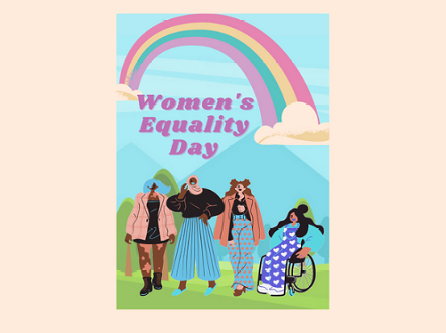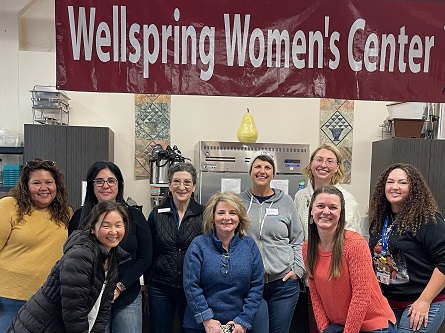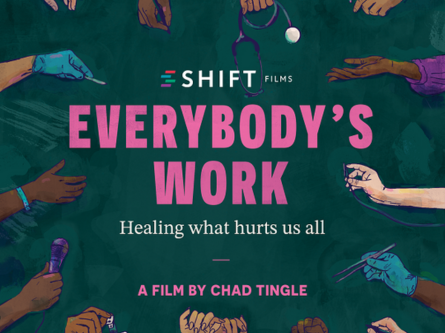By Mary Padilla (she/they), UCD 2023, Community Organizer, and Brie Hornig (she/her), M.Ed., Program Coordinator, Women’s Resources and Research Center.
Spotlight on Reproductive Health by Mili Adhikari (she/her), School of Medicine M.D. candidate, class of 2025.
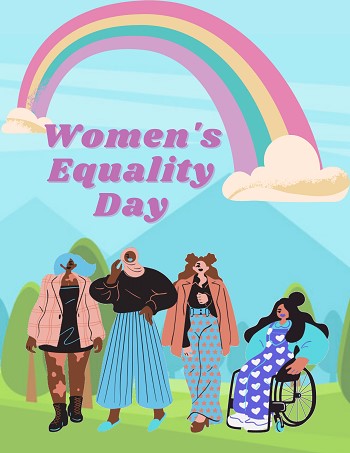
Every year on August 26th, people across the United States come together to celebrate Women’s Equality Day. This annual commemoration, designated by Congress in 1973, recognizes the ratification of the 19th Amendment in 1920, which granted American women the right to vote. In celebrating the gains of the Women’s Suffrage Movement and First Wave Feminism, we must recognize the complex and oppressive history that accompanies this day.
The passage of the 19th Amendment marked a momentous change in the history of the United States, as the right to vote was codified as a constitutional right that could not be denied or abridged on account of sex. The struggle for the right to vote was a struggle steeped in decades of civil disobedience, marches, and protests that can be traced back to the 1848 Seneca Falls Convention. Highly regarded as the birthplace of the women’s suffrage movement in the United States, Seneca Falls has largely been hailed as the first women's rights convention in the country, yet notably, women of color were outright excluded from the convention itself. The enormity of the movement’s gains cannot be overlooked nor understated, but neither can the harm of its single-issue framework, which actively opposed voting equality for people of color.
In response to the explicit racism evident in the Seneca Falls Convention and the growing suffragette movement of the mid-nineteenth century, in 1896, Mary Church Terrell and Josephine St. Pierre Ruffin helped co-found the National Association of Colored Women (NACW), a national organization of clubs focusing on the compounding issues faced by Black women such as the fight for women’s suffrage and the struggle against Jim Crow laws. Thus, the American suffrage movement was not only internally splintered in terms of strategy, but further diverged along racialized lines. Nonetheless, after countless decades of struggle, the 19th Amendment was passed by Congress on June 4, 1919, officially ratified on August 18, 1920, and certified eight days later on August 26, 1920. However, despite achieving such a landmark victory, voting inequities and the uneven distribution and access to political power was still deeply evident in the post-19th Amendment era, a mere 3% of voting-age Black men and women were registered to vote in the South in 1940 due to violence, poll taxes, literacy tests, and public intimidation. Moreover, Indigenous Americans weren’t guaranteed citizenship in every state, and thus the right to vote, until 1962. Voting rates and registration numbers for Black citizens rose significantly after the passage of the 1965 Voting Rights Act, a notable achievement of the Civil Rights Movement of the 1950s-1960s, which outlawed discriminatory voting practices and essentially enforced the liberties guaranteed by the fifteenth amendment (the right to vote could not be denied or abridged on account of race).
But legislation can only go so far without active cultural, pedagogical, and systemic shifts. On this forty-ninth celebration of Women’s Equality Day, we celebrate the pioneering Black feminists, like Sojourner Truth, Frances Harper, Ida B Wells and countless others who laid the foundation for ongoing political movements of today. On this forty-ninth celebration of Women’s Equality Day, women of color, poor women, immigrant women, queer women, disabled women, and trans women still face barriers to not only accessing political power, but basic human rights and services. In 2022, 102 years after the ratification of the 19th Amendment, women are still subjected to disproportionate levels of violence, face workplace discrimination, are still led to believe that femininity is weak, and most recently, have had their bodily autonomy revoked with the overturning of the landmark Supreme Court decision Roe v. Wade on June 24th, 2022. This Women’s Equality Day, we at the UCD Women’s Resources and Research Center (WRRC), encourage you to celebrate the ratification of the 19th Amendment, actively combat historical erasure, commemorate the overlooked Black suffragists, and to engage in practices of radical healing and rest, because the fight is not yet over.

The UC Davis Women’s Resources and Research Center, located on the first floor of North Hall, is a campus community center providing education, resources (informational, basic needs), community programs, and a safe space for women and all people who experience gender-based oppression. Established in 1971 due to the work of the Women’s Liberation UCD student organization, the WRRC challenges all forms of oppression, through the lens of intersectional gender equity. Through collaborative efforts, the WRRC offers student-parent support (free diapers, wipes, nursing pads), a personal care and resources pantry, free menstrual/safer sex products, private room reservations, confidential drop-ins regarding sexual violence, and weekly community programs. As we celebrate the gains of the women’s rights movement today, we recognize that in the current political climate of our country, not only is the work to be done more critical than ever, but as is the need for radical community love and support, and that is the greatest resource the WRRC can provide.
Resources from WRRC
- Women's Resources and Research Center (WRRC)
- Student Affairs Message on Reproductive Healthcare Services
- SHCS Pregnancy Testing and Options
Spotlight on reproductive health:
Learn about the recent Reproductive Justice Teach-In at UC Davis Health
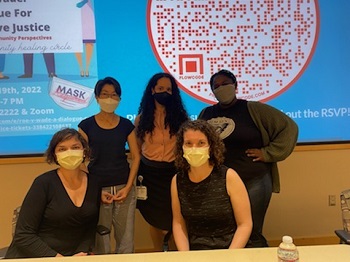
On May 19th, 2022, one week after the leaked supreme court decision to upend Roe v. Wade, the constitutional right to privacy, which previously protected the right to abortion, Mili Adhikari and Natalie Elise Pearlman, two first-year medical students along with some peers organized the first Reproductive Justice Teach-In at UC Davis School of Medicine. This was a opportunity to provide an informative panel discussion about Roe v. Wade and Dobbs v. Jackson, women's health and the implications of those future decisions on medical care, providers, legality, and the political sphere. This conversation foreshadowed the challenging times ahead when the Supreme Court finalized this decision in the early mornings of June 24th, 2022.
Without official structure, but a burning desire for justice and equity, the Reproductive Justice Teach-In is composed of medical students, faculty, trainees, learners, patients, and community members of the University of California, committed to the health, safety, and equity of our communities, which is impossible without ensuring reproductive rights. As members of the UC Health System, we are not only committed to our mission to deliver exceptional care that improves the health and well-being of all people living in California, the nation and the world, but also to hold the system accountable. As a California public land grant institution, the UC Health network is responsible for providing accessible, full-scope healthcare; training a representative healthcare workforce; and funding research to continually improve both access and direct care for the benefit of the public. As learners and trainees, we seek to advocate, educate, and strategize for solutions that ensure reproductive justice.
The June 24th panel consisted of:
- Mika Godzich, M.D., M.S. (moderator), UC Davis Health
- Juliana Melo, M.D., M.S.C.S, UC Davis Health
- Nicole Economou, M.D., M.P.H, UC Davis Health
- Lisa C. Ikemoto, J.D., LL.M., UC Davis School of Law
- Nakia Woods, BA , The California Coalition for Reproductive Freedom (CCRF)
With Roe v. Wade overturned, more than half of the states, concentrated in the South, Midwest and Plains, have taken action to ban abortion, most through trigger laws that took effect when the decision was made. Many of these states would ban abortion in almost all circumstances, forcing survivors of rape or incest to carry a pregnancy to term and prevent doctors from providing medically necessary care. The health and financial ramifications of this decision is devastating to people across the country seeking abortion care, but falls most heavily on communities already marginalized by the oppressive web of systemic racism, sexism, extractive colonialism, heteropatriarchy, ableism, and classism. Furthermore, this will create a ripple effect across the globe.
This decision impacts the ability of medical providers to provide equitable and appropriate medical care, ensure patients autonomy, protect their privacy, and ensure their human rights. Moreover, the concentrated attacks on abortion access, and right to privacy, not only impacts abortion care but also contraception access, fertility medicine, marriage equality, and other fundamental freedoms to live a healthy, happy life with dignity. Furthermore, this decision impacts medical student and trainees education, our ability to use evidence-based medicine, and honor patients autonomy and privacy.
The Reproductive Justice Teach-In is currently recruiting members who want to learn, educate, organize, and strategize ways to mitigate this gross injustice. For more information please reach out to tadhikari@ucdavis.edu.

